Met director: ‘This work respects the Klinghoffers’
mainThe Jewish Daily Forward has published an extensive, balanced and carefully nuanced article on the current furore surrounding John Adams’s opera, The Deat of Klinghoffer, which opens tonight at the Met.
In it, the British director Tom Morris says: ‘One of the sadnesses … is that Leon Klinghoffer’s daughters have become estranged from it as a work of art… My wish would be that they would come and see that there is an extraordinary respect for the characters based on their parents.’
Peter Gelb says: ‘For people to call me a self-hating Jew is so ludicrous that it’s beyond chilling. It’s outrageous and unfair. I’m being victimized and being attacked, but it hasn’t lessened my resolve. To bow under unfair pressure is not something I would do.’
And Alice Goodman reveals that she withdrew from working with Adams and Peter Sellars on another opera, Dr Atomic, because she felt its original presentation of Robert Oppenheimer as a Faust-like character was antisemitic. ‘There’s no way you can tell that story with Oppenheimer as Faust and not have it be anti-Semitic,’ she says. Read Adam Langer’s excellent article here.
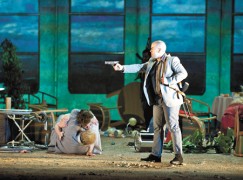

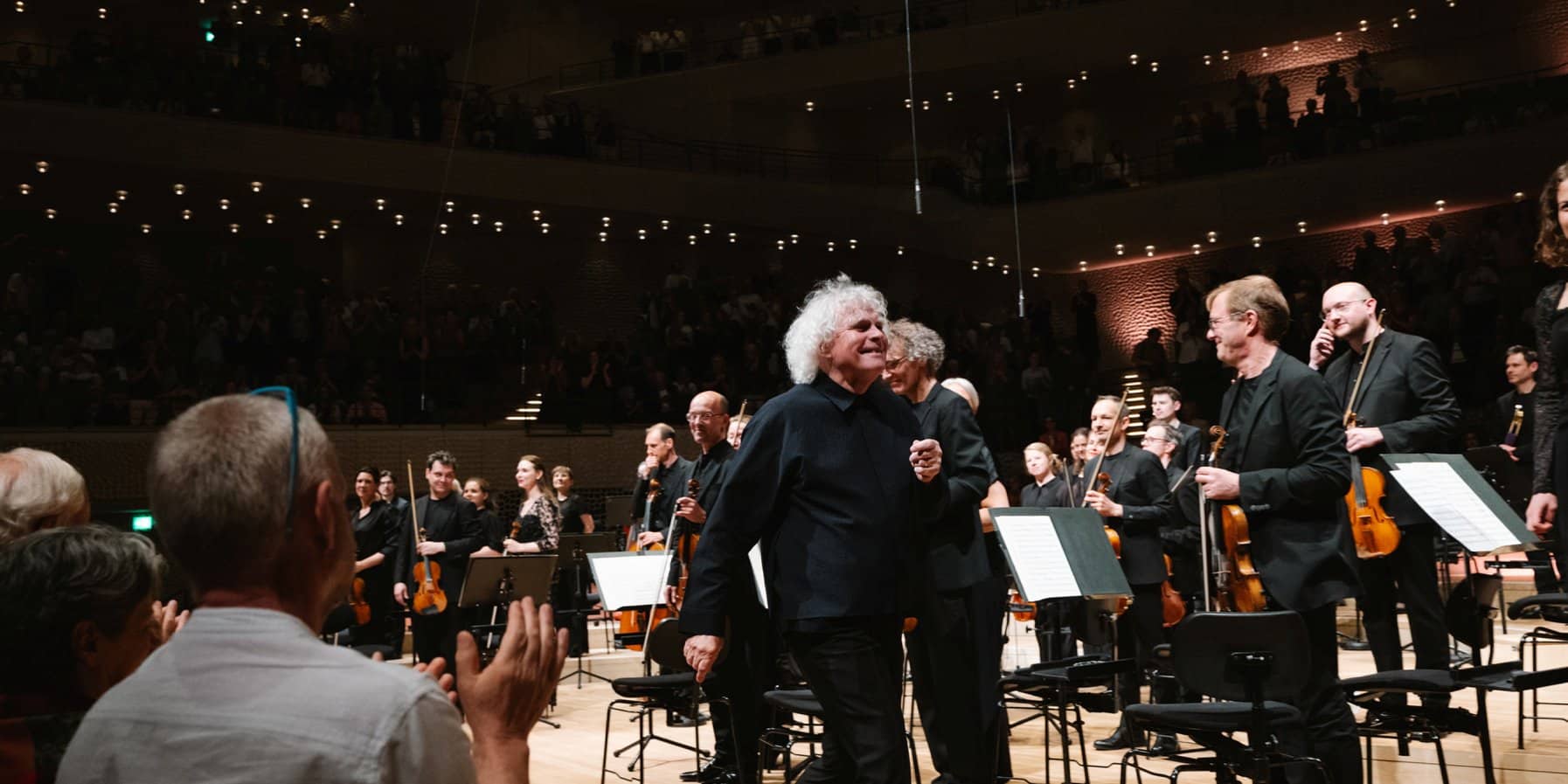
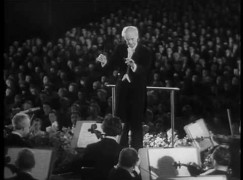
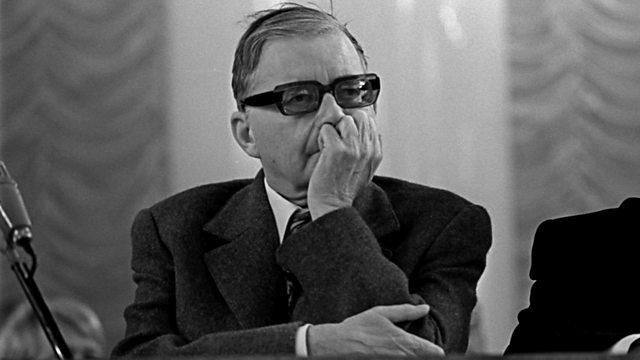
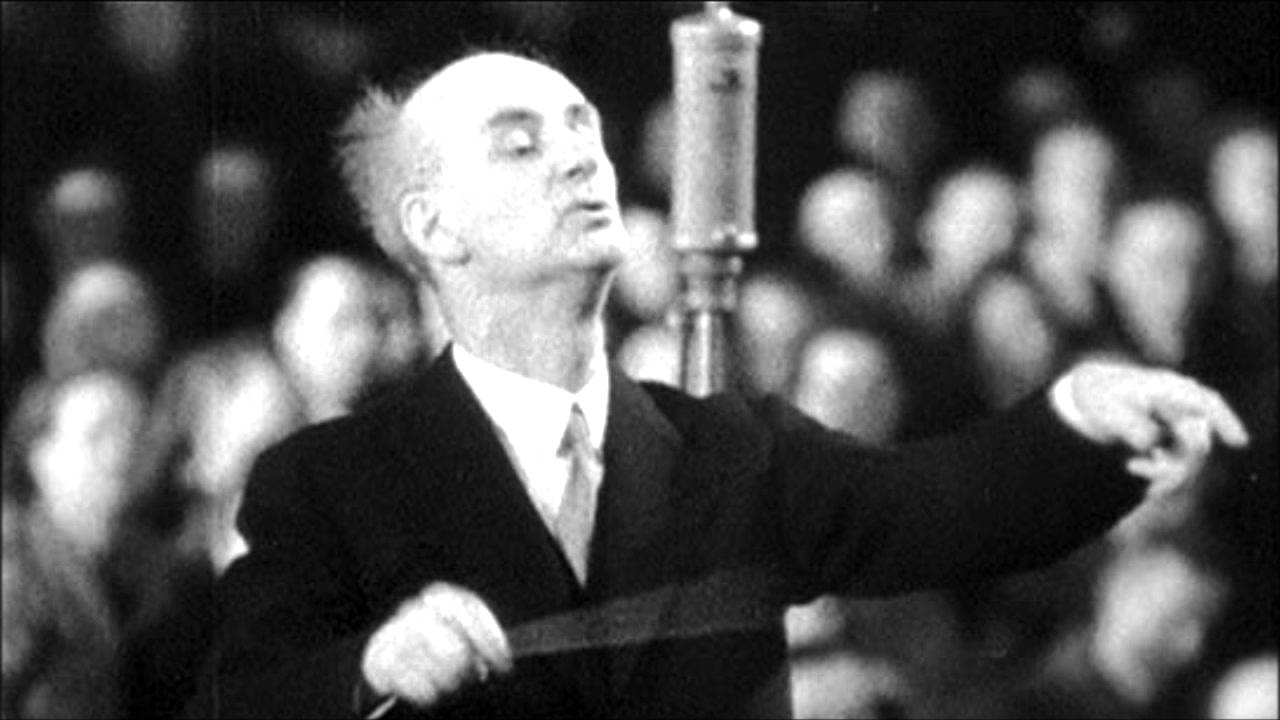
I like the video trailer the Met has produced for Klinghoffer. Alice Goodman had several other very interesting opera projects in mind before her career was stopped by the Klinghoffer controversy. One was to be about the Waco incident. Read more about her and her planned projects here:
http://www.theguardian.com/music/2012/jan/29/alice-goodman-death-klinghoffer-interview
I would like to reiterate that the efforts to stop the Klinghoffer production do not represent the Jewish community as a whole. In fact, I strongly suspect that it is only a relatively small minority who have tried to stop it. I wish we could see some poll numbers — though the small numbers that showed up for the protests at the Met already indicate that the objections are not wide-spread. Even if the community might have some apprehensions about “Klinghoffer,” the suppression of art runs counter to the the traditions of progressiveness, culture, liberalism, education, and tolerance that have long characterized the American Jewish community. I’m sorry one even has to mention this.
Mr. Osborne:
How about if that poll were limited to Jews married to Jews and who deeply care that their children marry Jews and who see their own future as profoundly tied to the Jewish People’s future?
Think that those who object to the romanticization of Jew-killing would still be the minority?
I’m sure you could setup some sort of poll to suit your agendas. And indeed, the point here is that it is very likely only a small minority of the Jewish community who wishes to stop this production.
Agendas?
All I asked was what the percentage of Jewish objectors would be were the poll limited to Jews who see their fate and that of their children and grandchildren as linked with that of the Jewish People.
Do you not see why those of us who view our fate this way have a bit more at stake when it comes to romanticizing Jew-killing than those whose children and grandchildren will not even call themselves Jews?
(And BTW, I am a regular at the Met.)
Adam Langer’s piece in the Jewish Daily Forward does honor to its journalistic tradition. Amidst all the acrimony surrounding the long overdue presentation of John Adams’ and Alice Goodman’s “The Death of Klinghoffer” at the Met, Langer’s voice is singular in its well balanced approach and convincing sanity. I like to point out that Lisa and Ilsa Klinghoffer have published their view as well, in the same Jewish Daily Forward (http://blogs.forward.com/forward-thinking/207587/klinghoffer-is-an-insult-to-our-father-s-m/?). Sadly, the comments on Langer’s piece make for sad reading. Especially Mr. Jeffrey Weinberg’s contribution – if one can call it that – reveals a harrowing narrow mindedness, which is on par with the similarly harrowing narrow mindedness of fanatics of every stripe everywhere in the world. Nothing good ever comes from that.
I’ll be pleased when the production ends because I don’t think I have read so much about a piece of art, ever, in my life. Most of the (endless) rants I have read about this work have put forward almost childishly one-dimensional arguments. Gelb was utterly right to resist the bullies and the abuse he has received is quite frightening really.
David, do you really think the work “romanticises” the crime? Really?
Michael:
Yes, I do.
The issue is not the score (which is stultifyingly banal), but the libretto (at least what I have seen of it, not having found the full libretto on the Net).
I would not object to an artistic treatment of the Palestinian issue or even the murder of Jews that was well-informed, serious, and rooted in some semblance of historic reality and scholarship.
The multiple articles in the Forward document Goodman’s romanticized distortions. No need to ask me for examples.
I have no issue with art that offends me, only with bad art that romanticizes those who express their unromantic blood-thirst for me and my people quite openly (read the Hamas Charter).
I would argue that a shortish opera can never give the full historical context to a story and the opera tells the tale of a microcosm of the Israeli-Palestinian conflict, one high profile event in the long history of violence.
I am neither Jewish nor Palestinian/Arab/Muslim so like a great many people, I see that conflict from the outside, looking in. I don’t “feel” it the way Jewish people or Palestinian people do with the levels of hatred that have grown. Films, plays, books, opera and the entire arts have depicted conflicts throughout history and in so doing represent, in the telling of the story, the views, the prejudices, the hatreds of the protagonists. That is what this opera does and because a character spits out the tropes of hatred for Jews, it seems to me utterly juvenile to focus on that and say “this is an anti-semitic” opera (as I have heard so many writers do). I can’t tell Jewish people how to feel about it but they must not tell me how to feel about it. In history, our mistakes have tended to be compounded by our refusal to countenance the view of those who wish to kill us. Personally, I have always felt that, with a few exceptions, the desire to kill for a cause, because of what one side or other believes is an absolute right, is something we should never ignore or reject out of hand, no matter how difficult.
I am from Britain; we had as you know a long conflict with people who believed in their cause to a degree sufficient for them to kill and die for it. They bombed and shot many people and this country for a long time refused point blank to countenance their view in any way because, as the vast majority of people felt, they went beyond the pale. I have met, as it happens, a man who was part of that killing and I spoke to him at length. This was a frightening man, a scary cold killer of a man. My instinct was to walk away, ignore, reject. But I learned something from hearing his explanation and his justification for something I myself could never imagine myself doing and which I still, to this day, totally reject as a means to achieving one’s aims. That man was in the country to be part of a team negotiating with the UK government to end the conflict.
To listen, to try at least to understand (without condoning I should stress) the motivation is in the end the only way forward in these conflicts. And art, no matter how much we may believe it to be one-sided, is a powerful way to teach us. DoK does not appear to me to take one side over another and it is wrong for those who feel they belong in some way to the conflict being portrayed to impose their interpretation of a conflict onto those who wish to experience it and learn from it. To express horror and outrage because the creators had the temerity to give the perpetrators of this murder a human voice is to continue to demonise and refuse to understand why people feel the need to kill us. Because in the end, the people who murdered Klinghoffer WERE human beings and that is precisely why these things are horrific.
Sometimes, these works which try to give an honest account of terrible events are clumsy, they make mistakes, perhaps they unintentionally, because of the partisan prisms of the audience, give favourable voice to one side or the other. But the people of NY have not, in my opinion, covered themselves in glory over this affair and have fallen into a censorious trap one might usually expect Americans to avoid.
Michael:
I agree that it would be impossible to present something as complex as this in a two-hour opera. That’s a reason why such things shouldn’t be attempted, not why we must support (in the name of “art”) ignorant propaganda that romanticizes ongoing efforts to kill a certain group of people (Jews) — NOW, TODAY, TOMORROW.
We are not talking about romanticizing only past murders and murderers (Klinghoffer’s), but TODAY’s.
Rather than impute silly little ditties to the murderers, words they never said, why not use the words they actually have said? Let Adams set the Hamas Charter to music. Or the speeches of Hamas’s leaders. Or the speeches of Iran’s rulers, all of whom have called for the mass slaughter of my people — and without the soulfulness of Goodman’s libretto? (Not that it makes a difference, but that’s the slaughter of ALL Jews (wherever they may be found), not just those who live in Israel.)
Well David, I can see I won’t be persuading you of anything. Let’s leave it at that.
Dear David, Michael: I have read your discussion here. I am sorry, David, but I have to concur with Michael: you appear not willing or able to be persuaded of anything, so let’s leave it at that.
I will travel across the US to attend one of the performances, because I want to hear and see for myself what this opera is about (disclosure: I have experienced Adams’ “Doctor Atomic” (in San Francisco), “Nixon in China” (Met), “El Nino” and “The Flowering Tree” (San Francisco), and “The Gospel according to the other Mary” (Los Angeles). So I want to experience “The Death of Klinghoffer” so as to complete my experiences of John Adams’ stage works up to this point in my life. I will fly in on the day of the performance, and fly back home the next day. I know that I will leave the performance with many more questions than I expect will come up (which questionsd, and how they arise, I have no idea. I go into the opera with the sense of both apprehension and anticipation). Neither of them will allow a simple answer (if any).
What I also know now, before the performance, and likely for a very long time after, is that a great and, yes, painful but necessary learning opportunity is missed as the result of the acrimony and protests well before the opera is performed.
I want to add that, in my opinion, the Met could and should have done much more in educational and other outreach. That is a shame, and very sad. The situation is, to me, a very unfortunate one – a sorry reflection of the deeply divided state of feelings and opinions in this country when it comes to the Israeli/Palestinian and Palestinian/Israeli conflicts.
I had hoped it would be possible to say something else than “let’s leave it at that” – a work of the poignancy of “The Death of Klinghoffer” is done a great disservice by such a circumstance. At least, the opera makes painfully clear that the deep issues it addresses may perhaps never be resolved.
Edgar: I think it’s great that you’d do that.
(I never called for the opera to be cancelled or closed down.)
A suggestion: Why not compare the words Alice Goodman puts into the terrorists’ mouths with what they really say (in Arabic, when speaking to their own audiences)? Check out MemriTV, for instance, and read the elected gov’t Hamas Charter.
Another suggestion: Do some reading as to the historicity of the account described in the opening chorus.
It’s not that i object to the murderers’ voices being heard, it’s that I object to Alice Goodman’s invented history that romanticizes those obsessed with killing me and my people as payback for invented wrongs.